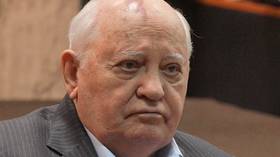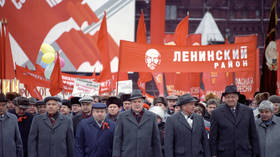Do People in Russia Want Communism Again
In December 1991, the Soviet Union came to an cease. Thirty years on, its last leader, Mikhail Gorbachev, has taken much of the blame. Russians may not want a return to communism, simply they blame him for the way it ended.
In Western eyes, Gorbachev is a heroic figure who ended the Cold War and brought freedom to Eastern Europe. In the eyes of ordinary Russians, notwithstanding, he's a man who managed in the space of but half-dozen years to bring a superpower to its knees and impoverish its people. A poll published concluding week past the Russian Public Opinion Enquiry Center (VTsIOM) institute Gorbachev to exist the "most hated person of the Soviet era," with 1 in v respondents singling him out. That ways the USSR's last premier is far less popular fifty-fifty than its second – Joseph Stalin, named by just ane in 10.
On the surface, this seems strange. Stalin oversaw a traumatic agricultural and industrial revolution, which led to the deaths of millions in the dearth of 1932-33. Hundreds of thousands more were killed during the Great Terror of 1937-38. Gorbachev, by dissimilarity, instituted the most rapid and far-reaching liberalization of gild in the entirety of Russian history. Under the slogans of glasnost and perestroika, he abolished censorship; allowed the showtime competitive elections since 1917; released all political prisoners; and enshrined international man rights conventions in Soviet law. Fifty-fifty more than than Tsar Alexander II, he deserves to exist known as the "Great Liberator."

Russians, it seems, practise not appreciate it. While Gorbachev gave his people formal liberty, he failed to provide them with the ways with which to enjoy it. His rule witnessed a catastrophic collapse in the Soviet economy. Gorbachev's biographer William Taubman writes that past the end of 1989, "only eleven percent of 989 consumer goods monitored by an economic inquiry organization were readily obtainable. Nigh entirely absent from stores were televisions, refrigerators, washing machines, well-nigh household cleaning products, furniture of all sorts, electric irons, razor blades, perfumes and cosmetics, school notebooks and pencils." Economically, perestroika was a disaster.
So likewise were Gorbachev's political reforms. The Soviet leader abolished Article vi of the Soviet constitution that designated the Communist Party "the guiding force of Soviet society." He allowed new political parties to grade, created the mail of Soviet President, and established an elected parliament. The result was chaos. The Communist Political party was the mucilage holding together the country. One time Gorbachev weakened it, the system unravelled with remarkable speed, destroying the authority of the government in Moscow, and unleashing centrifugal forces that bankrupt the Soviet Matrimony autonomously.
Arguably, this was all for the good in the long term. The communist system had proven unable to cope with the demands of a modernistic economy. Some caste of creative destruction was probably necessary to permit a new, more productive, organization to develop. Russians today are much freer and, for the most function, wealthier than they were forty years ago, before Gorbachev. In a sense, it all ended well. But it took a long fourth dimension for the benefits to go clear, while in the brusque and medium term the devastation was enormous. And for this Gorbachev deserves a good bargain of blame.
The Soviet leader recognized that the organisation he inherited was not working well. He was genuinely committed to improving it. But he never understood the reasons why it wasn't working and failed to develop a proper plan to do something most it. Instead, he improvised a set of ad hoc responses, each of which made things worse.
At the heart of the trouble was the fact that Gorbachev didn't have a expert grasp of economic science and was close to clueless nigh free markets. Graham Allison, who with Grigory Yavlinsky presented a reform plan to the Soviet leader in 1991, remarked that he and Yavlinsky were shocked by the "dumb questions Gorbachev asked, peculiarly about private property." Gorbachev sincerely believed in socialism as an economic organisation, writing in his 1987 book Perestroika, that: "We are conducting all our reforms in accordance with the socialist choice. … Socialism and public ownership, on which it is based, concord out almost unlimited possibilities for progressive economic processes."
Consequently, Gorbachev never did annihilation more than than tinker with the socialist system, for instance, by loosening state planning controls. The results were decidedly negative. Simply instead of questioning the validity of his policies, the Soviet leader concluded that if they weren't working it must be because conservatives in the Communist Party were sabotaging them. There was no good reason for this determination, simply having made it Gorbachev determined that the solution was to smash the ability of the Party apparatus.

In doing so, he eliminated the simply mechanism the land had for regulating the economy, without at the same time introducing the kind of spontaneous regulators that be in marketplace systems. The result was that things went from bad to worse. Equally they did so, Gorbachev doubled downward on his belief that the cause was bureaucratic sabotage, sped up his political reforms, and so accelerated the system's plummet.
This was not the simply mistake Gorbachev made. He also failed to comprehend the strength of nationalist sentiment in certain regions of the Soviet Marriage and the fact that political liberalization would probable event in the growth of separatist movements. In a speech marking the 70th ceremony of the Russian revolution, he even went and so far every bit to declare the national problem in the Soviet Union to be "solved." When confronted with the demands of minority nationalities, Gorbachev was completely at a loss as to how to reply.
In brusk, the tragic fate of the Soviet Union was to exist led by someone who understood that radical change was necessary but who completely misdiagnosed the problem and therefore pushed forward entirely counterproductive solutions.
The Soviet system was both repressive and inefficient. Russians are improve off without information technology. Thirty years on, Russians' intense dislike of Mikhail Gorbachev is not a sign that they want to get back in time before him. Simply information technology does suggest that many of them retrieve that they could take gotten rid of communism in a much less harmful mode.
The statements, views and opinions expressed in this column are solely those of the author and do not necessarily represent those of RT.
The statements, views and opinions expressed in this column are solely those of the writer and do not necessarily represent those of RT.
schaefersakis1990.blogspot.com
Source: https://www.rt.com/russia/543029-want-soviet-union-back/
0 Response to "Do People in Russia Want Communism Again"
Post a Comment